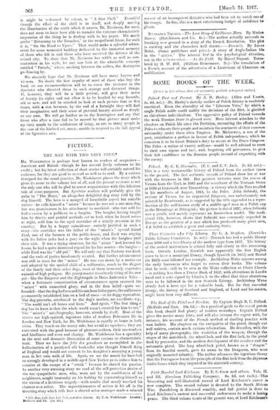FICTION.
THE MAN WITH TWO LEFT FEET.*
MR. WODEHOUSE is perhaps best known to readers of magazines— American and • British—though he has several lively volumes to his credit ; but his latest collection of short stories will certainly extend his audience, for they are good to re-read as well as to read. By a curious disregard for the usual practice, Mr. Wodehouse places the story which gives its name to the volume last of all, and the present reviewer is not the only one who will be glad to renew acquaintance with this hilarious tale of cross-purposes. But Spectator readers will probably give the Palm to " The Mixer," an altogether delightful dog story told by the dog himself. The hero is a mongrel of formidable aspect but amiable nature—he calls himself a " mixer " because he was not a one-man dog, but was promiscuous in his attachment to mankind—who was sold for half-a-crown by a publican to a burglar. Tho burglar, having taught him by drastic and painful methods not to bark when he heard noises at night., sold him to the aged caretaker of a stately mansion in the country. But by a happy coincidence—entirely justified in such a story—the caretaker was the father of the " mixer's " special friend Fred, one of the barmen at the public-house, and Fred was staying with his father (who had a gun) on the night when the burglars paid their visit. It was a trying situation, for the " mixer " had learned his lesson, he had a quite irrational regard for his late master—the burglar— while Fred was his " old pal." We will only say that Fortune was kind, and the ends of justice handsomely secured. But further advancement was still in store for the " mixer." Ho was run down by a motor-ear and adopted by the spoiled child of a millionaire, much to the disgust of the family and their other dogs, most of them immensely expensive enamels of high pedigree. His young master was already tiring of his new pet—like the Emperor and the Nightingale in Hans Andersen's Tales— when a fortunate concatenation of circumstances again crowned the " mixer " with unmerited glory, and in the firm belief—quite un- founded—that the dog had rescued his son from kidnappers, the millionaire permanently established him on a bed of roses—or its doggy equivalent. The dog-proverbs, attributed to the dog's mother, are exeellent.–e.g., " The world isn't all bones and liver." And again, " The first thing a dog has to learn is that the whole world wasn't created for hint to cat." The " mixer's " autobiography, however, stands by itself. Most of the stories are high-spirited, ingenious tales of modern Bohemian life in London and New York, for Mr. Wodehouse is equally at home in both cities. They touch on the seamy side, but avoid its squalors ; they arc concerned with the good humour of pleasure-seekers, their camaraderie and kindliness and even real charity. Mr. Wodehouse has a speciality in the neat and dramatic illustration of some curious or characteristic trait. Thus we have the folie des grandcure as exemplified in the hallucination of a paralysed old bookseller who thought himself King of England and would not consent to his-daughter's marrying a young man in her own walk of life. Again, we see the mania for base-ball so strongly developed in a middle-aged New Yorker as to induce him to connive at the escape of a " crook " because he shared his passion. In another very amusing story we read of the self-protective device of the too sympathetic man, who, worn out by the confidences of his neighbours, sought immunity on his holiday by representing himself as the victim of a fictitious tragedy—with results that neatly wrecked his chances as a suitor. The superstitiousness of actors is hit off in the diverting story which tells how a shrewd actor-manager made a salaried • The Man with Twn Left Pat and other &Win. lsy r. G. Wodehouse. London: atetimeu and Co. [As. new
mascot of an incompetent detective who had been set to watch one his troupe. In fine, this is a most entertaining budget of antidotes le gloom.


























 Previous page
Previous page